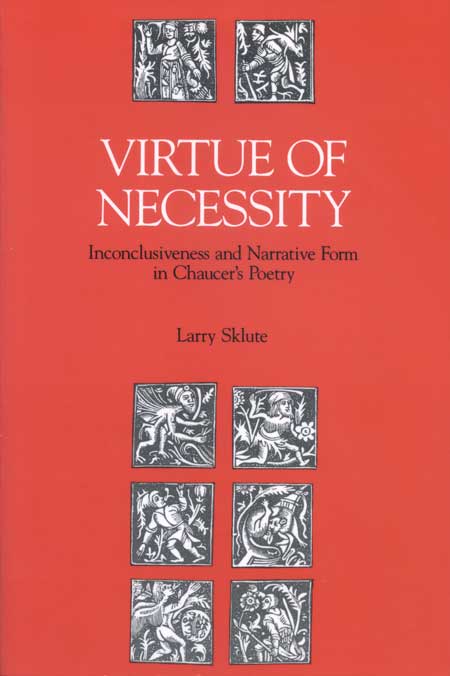| click here to read the full text of the book | leave / read comments and critiques of the book |

Virtue of Necessity
Inconclusiveness and Narrative Form in Chaucer’s Poetry
Larry Sklute
Chaucer left many of his poems unfinished. The House of Fame breaks off shortly before its end; the Legend of Good Women has two prologues and stops just before the narrator gives us the conclusion to the Legend of Hypermnestra. And the Canterbury Tales is a work of fragments within which the tales by the Cook, the Squire, the Monk, and the Pilgrim Chaucer are all incomplete.
This incompleteness becomes particularly interesting when one considers that Chaucer’s completed narratives fascinate most by their inconclusiveness. The Book of the Duchess solves a problem different from the one posed by its beginning. The Parliament of Fowls raises several questions about value that it never answers. And Troilus and Criseyde insists on answers that many students of medieval literature agree the body of the work neither asks nor requires. The Canterbury Tales, in its fragmentary structure, its alternating points of view, and its way of presenting debate without closing it, simply refuses to be conclusive.
In his examination of these frequently noted characteristics, Larry Sklute suggests some historical reasons for Chaucer’s inconclusiveness and considers how it both creates and affects meaning in his narrative forms. Dr. Sklute reads each work as Chaucer’s attempt to represent such antinomies as experience and authority, belief and proof, freedom and necessity, truth and opinion. He finds the inconclusiveness of Chaucer’s poems an indication that their author was not always satisfied with how well the narrative forms he had inherited embodied human experience; and he sees the shape of Chaucer’s literary career as a search for an appropriate form able to accommodate the inconclusiveness these antimonies create. The inconclusiveness that prevails throughout Chaucer’s literary career leads him to discover in the Canterbury Tales a kind of narrative unique in the Middle Ages—a form that provided an early model for modern fiction.
| 1984 160 pp. | This title is no longer available in a traditional print edition. Click here for free access to the book's full text. |

